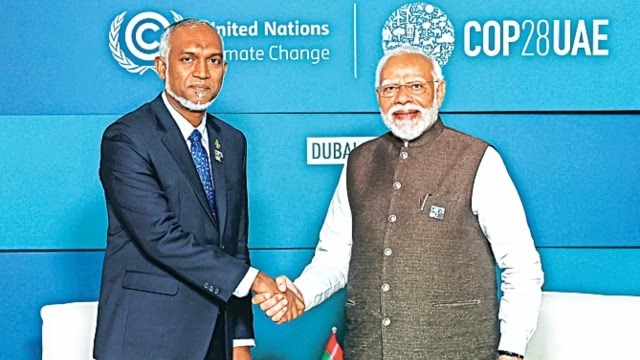
By Our Correspondent
NEW DELHI – The bilateral relations between India and Maldives have reached a low ebb following the
new Maldives government’s decision not to renew a memorandum of understanding (MoU) with India
for cooperation in hydrography, shortly after its pledge to send back Indian troops stationed in the
country. Since the newly elected President Mohammed Muizzu has taken over the reins, Maldives
seems to be on the way to reversing its “India First” policy.
Muizzu, who is the eighth President of Maldives since independence from Britain in 1965, was elected in
September this year following his campaign during the polls in which he pledged to remove Indian
troops from the archipelago and restore the country’s sovereignty. Once Muizzu assumed charge, the
core demand of the “India Out” campaign led by former President Abdullah Yameen, found mention in
his first set of official announcements.
The Maldives Cabinet has decided against renewing the MoU with India for cooperation in
hydrography, which was signed in 2019 and was due to expire in 2024. It is a clear indication that the
new government of the Indian Ocean’s archipelago wants to reverse the pro-India policies of the
previous administration.
The MoU for cooperation in hydrography mainly pertained to the study of ocean and compilation and
analysis of data, maps and charts, while looking at physical attributes of water bodies and predicting
how they might change over time. In addition to ensuring the safety of navigation, the MoU supported
other activities, such as economic development, security and defence, scientific research and
environmental protection.
Hydrographical measurements under the MoU included tidal, current and wave information for
Maldives, which comprises a group of islands scattered in Indian Ocean, south-west of India and Sri
Lanka. The MoU was signed in June 2019, during Prime Minister Narendra Modi’s state visit to the
Maldives. It was Modi’s first overseas visit after assuming office for his second term, and his second
visit to the Maldives since he participated at President Ibrahim Mohammed Solih’s swearing-in
ceremony in 2018.
President Solih and the ruling Maldivian Democratic Party had secured a landslide victory in the general
elections in 2018. The two Indian Ocean neighbours and their leaders, backed by a decisive majority,
had launched a close cooperation in development, defence and maritime security. Following the
agreement, the Maldives National Defence Force and the Indian Navy carried out three joint
hydrographic surveys in 2021, 2022 and 2023.
Though President Muizzu has not made a statement specifically on the MoU on the joint hydrographic
survey, the government officials have told the media in Maldives that the decision was aligned to the
current administration’s pledge to terminate all agreements with foreign parties which were
detrimental to national security. Under-Secretary for Public Policy Mohammed Firzul said it was in the
best interest of Maldivian sovereignty that this capacity was improved within the country’s own
military.
Maldives wants to entrust archipelago’s security to its own military
The new Maldives government is seemingly taking action to entrust its own military with the
responsibilities of surveilling and policing the archipelago’s waters and excluding the participation of
any foreign party in these operations. Amid these developments, India may have to brace for a
challenging phase of its partnership with Maldives despite the BJP government’s claims that it exercises
influence in India’s neighbouring countries.
Maldives is also a member of the Colombo Security Conclave, which is an initiative aimed at enhancing
Indian Ocean maritime security and includes India, Sri Lanka and Mauritius. Earlier in December,
Maldives skipped the latest round of the Conclave’s National Security Adviser-level meeting held in
Mauritius. It coincided with Maldivian Vice-President Hussain Mohammed Latheef’s visit to China to
attend the China-Indian Ocean Region Forum on Development Cooperation, where he said his country
was eager to explore novel avenues of collaboration and cooperation with China.
In its response to the Maldives Cabinet’s decision, the Narendra Modi government’s External Affairs
Ministry has said that India has a proven track record in the field of hydrography. The Ministry’s
spokesperson Arindam Bagchi said at a media briefing that India had been cooperating with several
countries in the Indian Ocean region on hydrography and various elements related to it, and the
benefits to partner countries were clearly visible.
It is quite evident that contrary to the BJP government’s claims, Maldives is slowly tilting towards China
by opening new avenues of collaboration and cooperation with it. Beijing has sought permission from
Maldives to dock its research survey vessel of the Yuan Wang series for conducting deep-water
exploration in the southern Indian Ocean. New Delhi has serious apprehensions about snooping on
Indian defence bases under the guise of research vessels.
China increases its footprint in Maldivian archipelago
China’s footprint in Maldives has increased and the archipelago has emerged as a nation in China’s
“String of Pearls” construct in South Asia. Maldives is trying to keep distance from multilateral platforms
driven by India, while Muizzu has made it clear that Indian soldiers will have to leave the island nation.
Around 70 Indian military personnel have maintained New Delhi-sponsored radar stations and
surveillance aircraft in the Maldives and this minuscule presence has been projected as a threat to
Maldivian security and interpreted as the establishment of a permanent Indian military base there.
Breaking away from tradition, Muizzu travelled to Turkey in November for his first official visit after
taking charge. Traditionally, the Maldivian President picks India for the maiden official visit in view of
close ties between the two countries. The political analysts in South Asia believe that Muizzu is showing
an intent to diversify and reorient his country’s foreign policy and searching for new friends among the
Muslim countries, making it clear that he wants to pull away from India.




